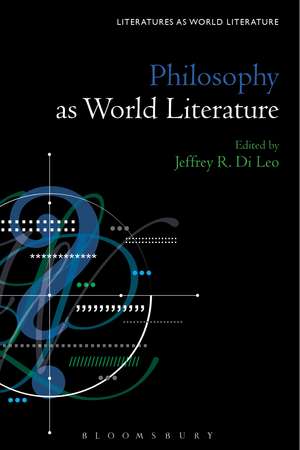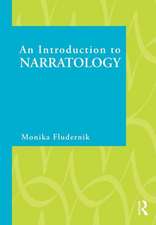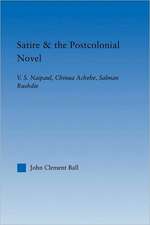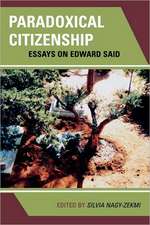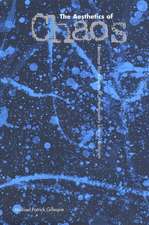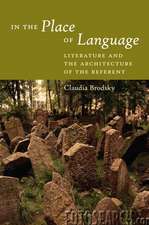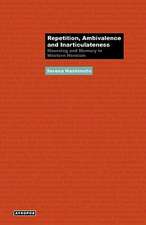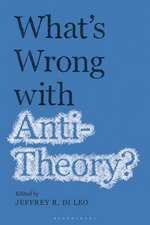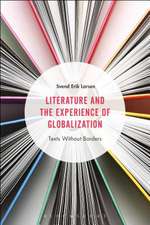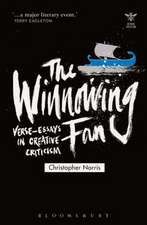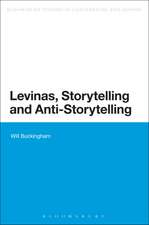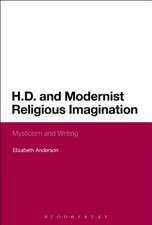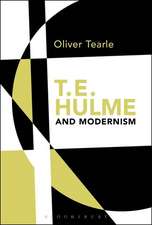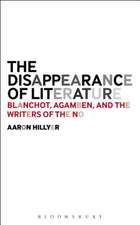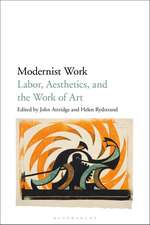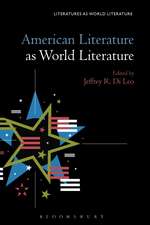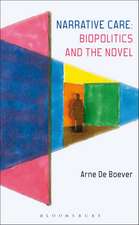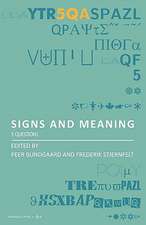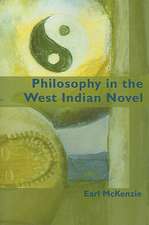Philosophy as World Literature: Literatures as World Literature
Editat de Professor Jeffrey R. Di Leoen Limba Engleză Paperback – 18 mai 2022
| Toate formatele și edițiile | Preț | Express |
|---|---|---|
| Paperback (1) | 199.20 lei 6-8 săpt. | |
| Bloomsbury Publishing – 18 mai 2022 | 199.20 lei 6-8 săpt. | |
| Hardback (1) | 716.31 lei 6-8 săpt. | |
| Bloomsbury Publishing – 25 noi 2020 | 716.31 lei 6-8 săpt. |
Din seria Literatures as World Literature
- 20%
 Preț: 219.84 lei
Preț: 219.84 lei - 23%
 Preț: 191.13 lei
Preț: 191.13 lei - 28%
 Preț: 466.39 lei
Preț: 466.39 lei - 23%
 Preț: 191.92 lei
Preț: 191.92 lei - 23%
 Preț: 192.19 lei
Preț: 192.19 lei - 22%
 Preț: 251.65 lei
Preț: 251.65 lei - 22%
 Preț: 236.92 lei
Preț: 236.92 lei - 24%
 Preț: 190.33 lei
Preț: 190.33 lei - 23%
 Preț: 197.14 lei
Preț: 197.14 lei - 23%
 Preț: 193.18 lei
Preț: 193.18 lei - 23%
 Preț: 191.67 lei
Preț: 191.67 lei - 23%
 Preț: 199.37 lei
Preț: 199.37 lei - 30%
 Preț: 776.32 lei
Preț: 776.32 lei - 23%
 Preț: 190.87 lei
Preț: 190.87 lei - 23%
 Preț: 192.64 lei
Preț: 192.64 lei - 22%
 Preț: 833.47 lei
Preț: 833.47 lei - 23%
 Preț: 193.36 lei
Preț: 193.36 lei - 30%
 Preț: 718.19 lei
Preț: 718.19 lei - 21%
 Preț: 217.27 lei
Preț: 217.27 lei - 23%
 Preț: 192.01 lei
Preț: 192.01 lei - 22%
 Preț: 231.81 lei
Preț: 231.81 lei - 23%
 Preț: 198.12 lei
Preț: 198.12 lei - 13%
 Preț: 256.59 lei
Preț: 256.59 lei - 23%
 Preț: 197.42 lei
Preț: 197.42 lei - 22%
 Preț: 238.49 lei
Preț: 238.49 lei -
 Preț: 239.14 lei
Preț: 239.14 lei - 30%
 Preț: 539.49 lei
Preț: 539.49 lei - 30%
 Preț: 540.38 lei
Preț: 540.38 lei
Preț: 199.20 lei
Preț vechi: 258.64 lei
-23% Nou
Puncte Express: 299
Preț estimativ în valută:
38.12€ • 39.90$ • 31.54£
38.12€ • 39.90$ • 31.54£
Carte tipărită la comandă
Livrare economică 07-21 aprilie
Preluare comenzi: 021 569.72.76
Specificații
ISBN-13: 9781501370717
ISBN-10: 1501370715
Pagini: 304
Dimensiuni: 152 x 229 mm
Greutate: 0.41 kg
Editura: Bloomsbury Publishing
Colecția Bloomsbury Academic
Seria Literatures as World Literature
Locul publicării:New York, United States
ISBN-10: 1501370715
Pagini: 304
Dimensiuni: 152 x 229 mm
Greutate: 0.41 kg
Editura: Bloomsbury Publishing
Colecția Bloomsbury Academic
Seria Literatures as World Literature
Locul publicării:New York, United States
Caracteristici
The first book to examine philosophy in the context of world literature, merging Western figures with authors and philosophers from Asia, Africa, and South America
Notă biografică
Jeffrey R. Di Leo is Professor of English and Philosophy at the University of Houston-Victoria, USA. He is Editor of the American Book Review, Founding Editor of the journal symploke, and Executive Director of the Society for Critical Exchange and its Winter Theory Institute. His recent publications include The End of American Literature (2019), The Bloomsbury Handbook of Literary and Cultural Theory (Bloomsbury, 2019), What's Wrong with Antitheory? (Bloomsbury, 2020), Philosophy as World Literature (Bloomsbury, 2020), Catastrophe and Higher Education (2020), Vinyl Theory (2020), and Happiness (2022).
Cuprins
AcknowledgmentsPhilosophy as World Literature: An IntroductionJeffrey R. Di Leo (University of Houston-Victoria, USA)Part I World, Worlding, Worldliness1. The World, the Text, and Philosophy: Reflections on TranslationBrian O'Keeffe (Barnard College, USA)2. Plato as World LiteraturePaul Allen Miller (University of South Carolina, USA)3. Worlding Interpretation, or Fanon and the Poetics of DisalienationNicole Simek (Whitman College, USA)4. Alluvia: The Palimpsest of African MemoryMichael Stern (University of Oregon, USA)Part II Migration and Difference5. Feminism as World LiteratureRobin Truth Goodman (Florida State University, USA)6. Astonishing Worlding: Montaigne and the New WorldZahi Zalloua (Whitman College, USA)7. Literature of the World, Unite!Peter Hitchcock (The Graduate Center, CUNY, USA)8. Transatlantic Thoreau: Henry S. Salt, Gandhi, and British Humanitarian SocialismDavid M. Robinson (Oregon State University, USA)Part III Philosophy, Religion, and the East9. Nietzsche and World Iterature: The Eternal Recurrence of Dualism in Thus Spake ZarathustraJeffrey S. Librett (University of Oregon, USA)10. Asian Philosophy, National Literatures, and World Literature AnthologiesJunjie Luo (Gettysburg College, USA)11. The Dharma of World LiteratureRanjan Ghosh (University of North Bengal, India)12. Olive-Red in Orhan Pamuk and Anton Shammas: Deconstruction's Eastward DisseminationHenry Sussman (Yale University, USA)Part IV Philosophy versus World Literature13. Existentialism as World Literature: De Beauvoir, Heidegger, and TolstoyRobert Doran (University of Rochester, USA)14. Jorge Luis Borges and PhilosophyEfraín Kristal (University of California, Los Angeles, USA)15. Philosophy for the Masses: Haldeman-Julius, Durant, and The Story of PhilosophyJeffrey R. Di Leo (University of Houston-Victoria, USA)List of ContributorsIndex
Recenzii
This is an important, timely, and much-needed collection of essays that not only builds bridges between philosophy and literature, but highlights the importance of global networks for both fields.
Philosophy as World Literature is a valuable contemporary intervention in the long-running quarrel between the philosophers and poets. By reconceiving their relation in terms of the shared problem of 'worlding,' it replaces old struggles over universality with concrete issues of translation, migration, colonization, and alterity. In the process, a philosophical work's textuality or a novel's philosophical significance is shown to be determined, prior to any theoretical debate, by the facts of its translation, anthologizing, and circulation through networks that are global in scope.
Certainly those of us who have long argued for the sisterhood of philosophy and literature, and labored to contribute to the tradition of an American philosophical fiction, will welcome Philosophy as World Literature with a cheer. But anyone and everyone who cares deeply about literature and philosophy will be thankful for this huge, necessary, and magnificent collection of illuminating essays.
Philosophy as World Literature is a valuable contemporary intervention in the long-running quarrel between the philosophers and poets. By reconceiving their relation in terms of the shared problem of 'worlding,' it replaces old struggles over universality with concrete issues of translation, migration, colonization, and alterity. In the process, a philosophical work's textuality or a novel's philosophical significance is shown to be determined, prior to any theoretical debate, by the facts of its translation, anthologizing, and circulation through networks that are global in scope.
Certainly those of us who have long argued for the sisterhood of philosophy and literature, and labored to contribute to the tradition of an American philosophical fiction, will welcome Philosophy as World Literature with a cheer. But anyone and everyone who cares deeply about literature and philosophy will be thankful for this huge, necessary, and magnificent collection of illuminating essays.
